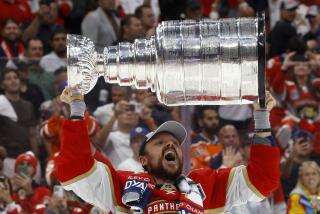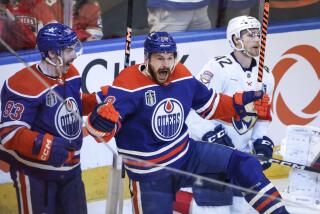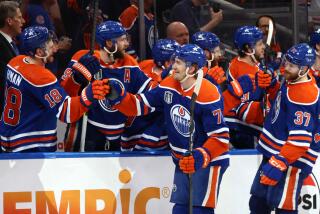Oilers Have Recovered From Trade
- Share via
BOSTON — Wayne Gretzky and all Edmonton wept. Oilers owner Peter Pocklington sat stoically beside him, the villain ripping the heart out of the city for cold cash.
It is Aug. 9, 1988. There is a news conference. The Trade is announced.
“There comes a time when . . . “ Gretzky says. He stops. He wipes away tears. Shaken, he leaves the microphone.
Oilers fans react immediately. There is amazement and anger. Trade Gretzky? Not Gretzky!
“It’s like taking all the bridges away and saying, ‘Edmonton, this is what you’re going to look like,’ ” the city’s mayor, Laurence Decore, said.
Radio stations are flooded with calls.
“It was terrifying,” recalls John Short, the host of an Edmonton sports call-in show. “In three hours, there may have been two people who said, ‘it’s a good business deal and hockey’s a business.’ Everybody else was ranging from outrage to catatonic.”
For $15 million, Jimmy Carson, little-known Martin Gelinas and three unknown future draft choices, the Oilers send Mike Krushelnyski, Marty McSorley and the best player in hockey history to Los Angeles.
The Oilers, winners of four of the last five NHL titles, certainly will struggle without Gretzky.
May 24, 1990: Less than two years later, the Oilers win the Stanley Cup.
They skate around the Boston Garden ice, holding the prize. It is their first championship without Gretzky. Or so it seems.
“There’s still part of him here and he’s a part of it if we win,” defenseman Kevin Lowe, still Gretzky’s close friend, said that morning. “There’s a lot of sadness in me (because) of him not being here.”
Nobody expected this so soon after The Trade. Surely, years of rebuilding would be needed before the Oilers could be legitimate Cup contenders. Last season simply reinforced that feeling.
Edmonton had its worst record in eight years and was eliminated in the first playoff round by Gretzky’s Kings.
“It was tough to adjust, not only for the players but for the coaches,” General Manager Glen Sather said. “Psychologically, if you can blend into your team the belief that you can win under any conditions then, at some point in time, they’ll believe it.”
Opening day of training camp, September, 1988: For the first time, the Oilers look around the dressing room and know Gretzky won’t be there. The reality hits home.
“It’s not like a bad dream and you’re going to wake up in the morning and he’ll be here,” said Lowe, who will have Gretzky in his wedding party when he gets married June 16. “He’s gone. We had to go on. Last year was almost a year of remembering, of trying to push it away but never forgetting.”
When training camp began this season, there was little cause to expect a championship. Carson had 49 goals last season but wasn’t happy in Edmonton.
On Nov. 16, 1989, the Oilers are 6-9-5 and in last place in the Smythe Division.
On May 24, 1990, they have won their fifth championship in seven years.
“I don’t think that anybody could say we felt we were going to be” in the finals, Coach John Muckler said 12 hours before the Oilers became champions.
What happened?
Nov. 2, 1989: Sather sends Carson and Kevin McClelland to Detroit for Adam Graves, Joe Murphy, Petr Klima and Jeff Sharples. Later, Sharples is traded to New Jersey for defenseman Reijo Ruotsalainen.
Graves, Murphy and Gelinas form an energetic young fourth line that excels against Boston. Sather said the Oilers wouldn’t have made the finals if he hadn’t made the trade with Detroit.
It may be heresy. It also may be true: The Oilers are as good, if not better, than they were with Gretzky. They are champions already and still have Los Angeles’ first-round draft choices in 1991 and 1993 to help make the dynasty of the ‘80s into one of the ‘90s.
Sather also gets credit for making the best of that deal.
Pocklington, a businessman with varied commercial interests and not a particularly favorable reputation even without the Gretzky deal, had decided to sell his major hockey asset.
Pocklington reportedly needed money for business. Gretzky had four years left on his contract. There were indications he might become an expensive free agent. Gretzky said he wanted the trade for personal reasons.
“The public should thank Glen because he salvaged it beautifully,” said Harry Sinden, general manager of the Bruins and a friend of Sather.
Still, Short said, Pocklington got death threats. Meat and dairy products distributed by his firms were boycotted.
“It’s not like Gretzky goes and the league says, ‘You play with only five players instead of six.’ Somebody does take his place,” Sinden said. “You’ve got to remember, they lost with Gretzky, too,”
In 1979-80 and 1980-81, Edmonton’s first two seasons in the NHL and Gretzky’s first two with the Oilers, they had losing records.
May 22, 1990: Toronto columnist blasts Pocklington and the trade.
“It was morally wrong then. It is morally wrong now,” Al Strachan writes in The Globe and Mail. “It will always be morally wrong. Whether the Oilers win the Stanley Cup or not, that fact will not change.”
Enough time has passed since The Trade for the Oilers to reach the top again. More time is needed for the emotional scars of Gretzky’s departure to heal.
“As Pocklington said himself, he was an icon,” Lowe said. “He was just a great player and a great person.”
And the Oilers are a great team, with or without Gretzky.
More to Read
Go beyond the scoreboard
Get the latest on L.A.'s teams in the daily Sports Report newsletter.
You may occasionally receive promotional content from the Los Angeles Times.






